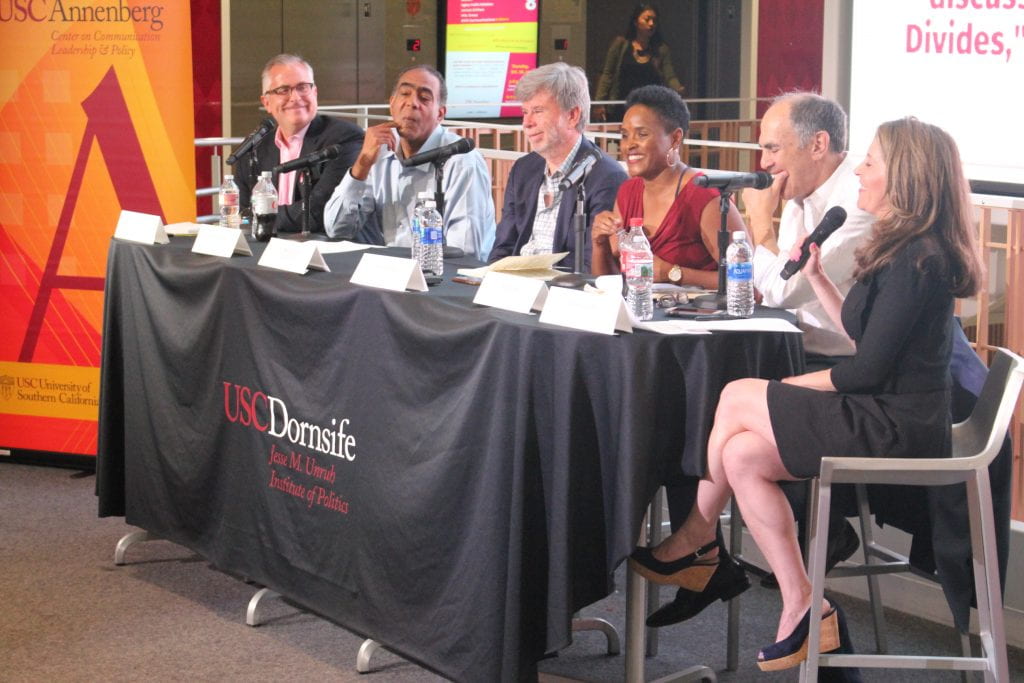On October 24, CCLP partnered with the Jesse M. Unruh Institute of Politics to host a panel discussion featuring a number of prominent political figures in California at USC’s Wallis Annenberg Hall. The event, titled “Mainstream or Extreme? The Intraparty Divides,” invited guests from across the political spectrum to comment on policy issues that separate the wings of each party from the moderates.
The panel was moderated by Jessica Yellin, a CCLP Senior Fellow and former CNN Chief White House Correspondent, and included speakers Kimberly Ellis, Former Executive Director of EMERGE California; Bill Carrick, a political consultant and founder of Carrick Consulting, Inc.; Mickey Kaus, author of Kaus Files and writer for Breitbart; Matt Klink, Partner at public affairs firm Ek, Sunkin & Klink; and former California State Senator Kevin Murray, President and CEO of the Weingart Center Association. Among other topics, the panelists discussed the Trump presidency, shifts in voter base, and disagreements over healthcare. The event was streamed on Facebook Live.
Klink pointed first to the Bush administration, then to the Obama administration, as causes of the Republican party divide. “Eight years in the wilderness has a great way of figuring that you can probably live under the same roof as someone, even though you disagree on almost everything,” said Klink, referencing the tensions between the Tea Party and Republican establishment that had long been brewing before Trump had even launched his campaign. “Now that they’re in office, and the Republicans control the House and the Senate and the presidency, they don’t agree on much.”
“There’s no way you can reconcile Paul Ryan and Steve Bannon,” added Kaus, a supporter of Bannon’s policies, to the conversation. Carrick differed: he noted that one path seemed far more beneficial for the preservation of the party long-term. “Bannon is a disaster,” he argued, commenting on the populist ideology and brand Bannon brought to the Trump campaign and the White House. “He doesn’t have a Republican agenda, he only has a Bannon agenda.”
Democrats, too, have experienced a split in party ideals, most notably between Bernie Sanders supporters and Hillary Clinton supporters during the Democratic primary. This division, with many Sanders supporters criticizing other Democrats for sticking to the status quo, has manifested in current elections, including in Ellis’ former bid for Chairman of the California Democratic Party and California State Senator Kevin de León’s recent challenge to incumbent Senator Dianne Feinstein.
Rather than ignore the left wing of the party while still relying on their votes, Carrick says, Democrats must make room for these new progressive ideas and voter groups. “We periodically go through this process of bringing in new constituencies, making them full partners in our party, and we’ve got to do that now,” he stated, referencing California’s past record of welcoming Hispanic voters who had previously aligned with Republicans. “It’s just a historical reality that this happens periodically.”
Ellis agreed, arguing that the Democrats’ failure to draw important voter groups out in 2016 cost them the presidential election. “There are three demographics that are known as the new american majority,” she stated, pointing to a shift in core identity within the Democratic Party. “Single women, people of color, and millennials.”
While the outcome of the party split among Republicans remains unclear, the Democratic panelists seemed to view their divide as an opportunity. “I do think there is a place for insurgency,” Murray said, optimistic about the implications of party division. “No institution can survive without a loyal opposition. You need some internal friction in order to keep yourselves moving.”
